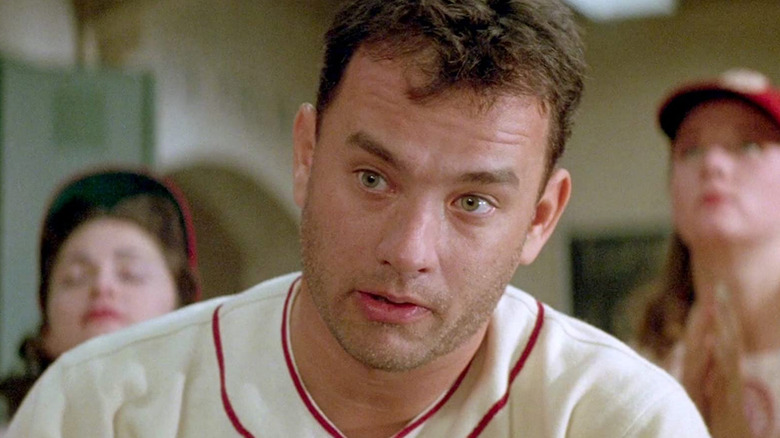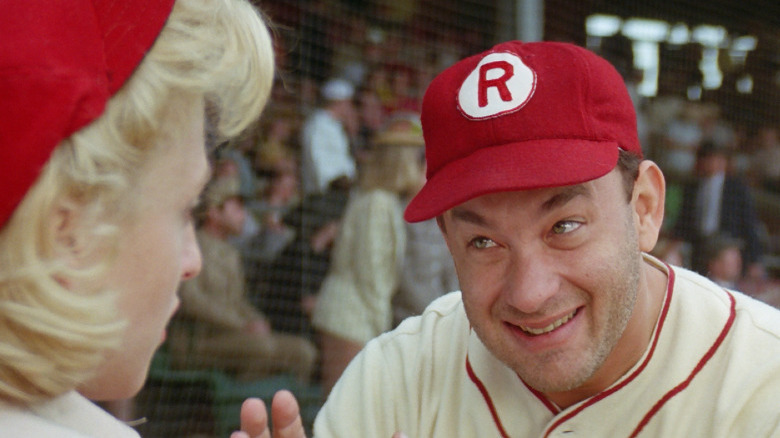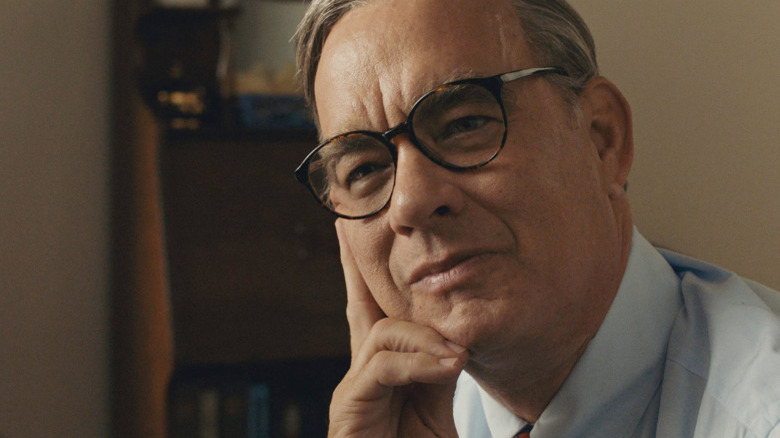A League Of Their Own Signaled A Shift In The Roles That Tom Hanks Would Take
In 1982, Tom Hanks landed his first leading role in a film with "Mazes and Monsters." Hanks stars in the made-for-TV movie as a college student who suffers a psychotic break from playing the titular role-playing game, a thinly-veiled fictional stand-in for real-life fantasy roleplaying games like "Dungeons & Dragons." It's "Reefer Madness" for RPGs, a laughably terrible propaganda piece based on a 1981 book that itself was inspired by inaccurate media stories trying to establish a non-existent link between mental health and a love of rolling "Nat 20s."
Thankfully, things only went up for Hanks from there. He would spend the rest of the '80s making his primary living as a comedic actor, starring in now-classic titles like "Splash" and "Big" in-between less successful comedy movies and his early attempts at drama in films like "Every Time We Say Goodbye." In time, however, Hanks would hit another low-point with his role in Brian De Palma's ill-famed 1990 flop "The Bonfire of the Vanities" (though not "low" on the level with "Mazes and Monsters," natch).
Everything changed two years later when Hanks starred in "A League of Their Own," the beloved 1992 sports dramedy that reunited the actor with his "Big" director Penny Marshall. In a 2001 interview with Oprah Winfrey, Hanks reflected on the ways the film marked a shift for him when it came to the type of roles he would take.
'I'm not going to play p****** anymore'
"A League of Their Own" kicked off an incredibly strong run for Hanks as an actor, giving him a string of critical and box office hits that lasted more than 10 years and steadily turning him into "America's Dad." The stark contrast between the movies he made before and after playing the foul-mouthed, heavy-drinking Jimmy Dugan in Marshall's baseball flick isn't lost on anyone, least of all Hanks. But what, exactly, was the change that resulted in him going from "Dragnet" and "Turner & Hooch" to "Philadelphia," "Toy Story," "Saving Private Ryan," and so on?
Speaking to Oprah, Hanks gave a, shall we say, colorful answer to the question:
"...Somewhere in the middle of my career, there came a moment when I said, 'I'm not going to play p****** anymore.' Up until then, I'd made a career out of playing ordinary guys who couldn't figure out how things work."
Wording aside, one can see Hanks' point. Prior to "A League of Their Own," he usually played characters who were in over their heads, if not utterly oblivious to what was going on around them. Like any shtick, this approach worked until it didn't, at which point Hanks had to reassess how he would pick roles. He explained:
"After I did 'A League of Their Own' [in 1992], I took a year off from making any artistic decisions. At that time, my career was an express train. I was continually being asked to make movies, so I felt I had won an actor's lottery. If people were asking, how could I say no? That would be insane. But I finally had to ask myself, 'What kind of creative entity am I? And when do I start to control some of my artistic destiny?'"
Hanks isn't done trying to be a better actor
Hanks has only continued to prioritize quality in his acting vehicles since 2001, with the occasional detour into what he's referred to as "commerce." This is also evident in the directors he chooses to work with, be they the Wachowski Sisters, Steven Spielberg, Paul Greengrass, or Clint Eastwood. It's not that every one of his movies from the last 20 years is fantastic or even good in some cases. But whenever he takes on a role, you can always grasp why — be it because he believes in the message the film around it has to say or views it as a real acting challenge.
Strangely, Hanks' career choices have led him to a place where he's almost underrated in the eyes of his peers. He's only been nominated for an Oscar once since 2001 (for "A Beautiful Day in the Neighborhood"), and yet I would argue he's actually a better character actor these days than he was at the peak of his box office powers in the '90s. Even when he forgoes naturalism and restraint with a turn like his one as Colonel Tom Parker in "Elvis" (who comes off seeming less like a real person and more like the titular villain in "Goldfinger"), one can respect the big swing.


